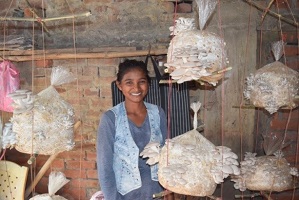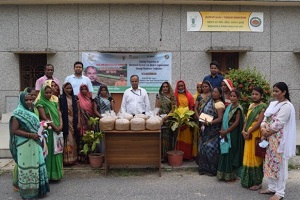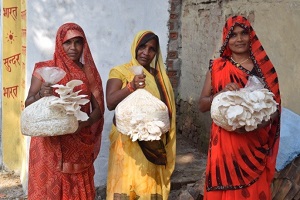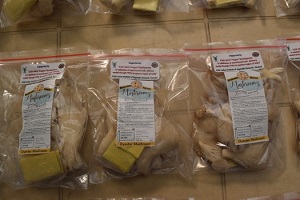Farmer’s Producer Organization (FPO) based extension delivery model performs better than the conventional extension delivery model. For assessing the efficiency of FPO based extension model, an initiative was taken at ICAR-Indian Institute of Vegetable Research, Varanasi by conceptualizing ‘Training to Marketing Model’ in mushroom production.


A three-day residential training programme on Nutritional security and women empowerment through mushroom production was organised during last week of August, 2021. Among 20 farm women participants, 10 were FPO members and rest 10 were not associated with any FPO. Hands on training was provided through learning by doing approach.
Post training, participants were encouraged to prepare mushroom bags and start mushroom production at their household level. After one month, during last week of September 2021, team of scientists from ICAR-IIVR visited the villages to see the progress in mushroom production. The team found out that mushroom bags were very poorly managed and were full of Coprinus (the unwanted fungus grows due to unhealthy conditions and mismanagement of the bags).



Next day, three women belonging to FPO category came back to IIVR and informed that, after returning from the training they forgot many of the aspects regarding management of the mushroom bags, which resulted in the failure and requested for another training. Being the members of FPO and peer pressure might have motivated them to return back and work for prosperity. On the other hand, the non-FPO women did not turn up.
So, another one-day workshop was organised to recapitulate the things and only interested 10 women were selected for the workshop.
In the month of November 2021, the team from ICAR-IIVR visited every mushroom unit and found out well maintained with bumper production of milky white oyster mushroom.
Oyster mushroom is less popular and have less market demand. Heavy mushroom flushes were coming out and the women group were worried about its marketing. The big challenge was the marketing and making small mushroom ventures sustainable.
The thought of starting marketing from IIVR emerged. Being part of a research organization all staffs of IIVR are well versed about the taste and nutritional value of oyster mushroom.
The women group brought the oyster mushroom at IIVR and it was sold at the rate of Rs. 100.00 per kg. They also marketed from other nearby organizations like bank, post office, schools and colleges. So, the “institutional marketing model” for oyster mushroom established.
Meanwhile link was established with one mushroom entrepreneur who started his business of value added mushroom products like mushroom pickle, chutney, mushroom powder etc. And he started collecting raw mushrooms from the women group. The group consisting 16 women had earned Rs. 25300.00 besides consumption at home during five months’ period of October 2021 to February 2022.
This is how the training on mushroom production reached a logical end towards sustainability with the group of farm women who were members of FPO.
FPO was the platform which motivated the women group to work together and find out different market possibility of the produce and supports the analogy that, “FPO based extension delivery model could work better than conventional extension delivery model”.
(Sourece:ICAR-Indian Institute of Vegetable Research, Varanasi)








Like on Facebook
Subscribe on Youtube
Follow on X X
Like on instagram